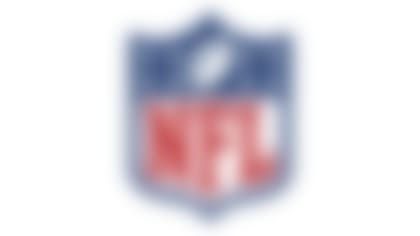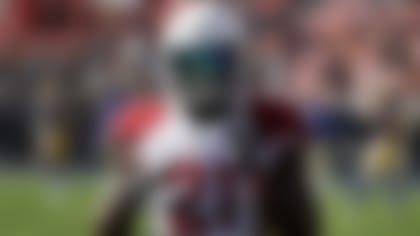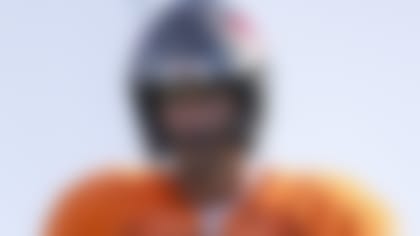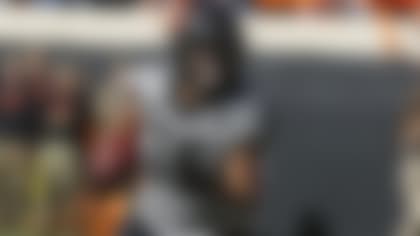William Hayes didn't watch any football this past weekend. He was primarily concerned with relieving the pain following surgery last week to repair a torn ACL in his right knee.
The injury happened in Week 3 when the Dolphins defensive lineman swung his leg as he contacted Raiders quarterback Derek Carr. It was Hayes' way of trying to sway himself to the side in midair so that he wouldn't land on Carr and draw a penalty for landing on the QB with all of his body weight. The problem was, his foot was stuck in the grass, ending his season in the most ironic of fashions -- a significant injury caused by trying to prevent Carr from feeling some pain.
So, in addition to the physical pain, the mental anguish of knowing he won't play again this season -- and realizing what it will take to get back on the field next year -- certainly didn't make Hayes eager to watch football.
"It's very frustrating because any guy who's played with me, they know what I put myself through in the offseason and every week just to get to the next game. To have that stripped away from me by trying to look out for somebody else's well-being and not my own is tough," Hayes said by phone Monday in his first public comments since the injury. "You're basically telling us, 'You can tackle everybody on the field one way, but this one guy, you're going to have to figure out how you can torque a 280-pound body in different ways to take the pressure off him.'
"It's frustrating as hell."
Hayes certainly hasn't been alone in his frustration. Packers linebacker Clay Matthews has been among the most vocal critics of the emphasis placed on the body-weight rule, especially after he was flagged for violations in back-to-back games against the Vikings and Redskins. Several members of the NFL's Competition Committee disagreed with the penalty Matthews received for his hit on Kirk Cousins. That play and a few others, along with the injury to Hayes, spurred the committee and the league office to clarify the rules for officials and teams last week.
The Competition Committee hoped there would be a reduction in body-weight penalties this past weekend, and there was. It appeared only the Chargers' Melvin Ingram was flagged for an infraction when he landed on the 49ers quarterback C.J. Beathard early in the third quarter of the Bolts' win over the Niners.
A review of all 68 sacks during Sunday's slate of games, as well as some other hits on quarterbacks after they released the ball, showed several factors led to fewer penalties. In many cases, the defenders didn't have a clear run at the quarterback the way Matthews did against Cousins and Alex Smith. On other plays, the quarterback ducked, sidestepped or contorted himself to avoid a direct hit and allow the defender to bounce or slide off of him.
There were also a few instances of defenders perhaps altering their technique to avoid a flag. Matthews seemed to slow his momentum before joining linebacker Nick Perry to sack Josh Allen. Later, Green Bay's Kyler Fackrell pulled Allen backward instead of falling forward onto him in the waning moments of the Pack's shutout victory. The Bengals' Geno Atkins, the Patriots' Adam Butler and the Colts' Margus Hunt also pulled quarterbacks down to the ground instead of falling on top of them. Though intent is difficult to determine, all of those players seemingly could've put their weight on top of the quarterback on those plays.
On Monday night, the Broncos' Von Miller had Chiefs quarterback Patrick Mahomes in his grasp after Mahomes threw the ball. Miller then let Mahomes go, realizing there was little to be gained and plenty to be lost if he'd completed the tackle. ESPN's mic on Miller caught Mahomes telling Miller, "Appreciate it, bro," for not falling on top of him.
NFL Network Insider Ian Rapoport reported Sunday the Competition Committee expects fewer body-weight calls going forward because the committee instructed officials to make sure a player applied all or most of his body weight when making a hit before throwing the flag.
But anyone expecting the controversy to go away should look to Ingram's hit on Beathard. It was a hit that's been legal for years in the NFL, and if it had occurred at a critical point in the game, there would've once again been plenty of conversation about the rule.
"My question is why won't they just put flags on the QBs?" Niners cornerback Richard Sherman tweeted on Monday, though it was unclear which play or plays sparked his tweet. "They would rarely hit the ground then. Guys would be able to grab the flags and that would be a sack. Guys are losing thousands of dollars just doing their job. Something has to change."
That was the message the NFL Players Association sent to the league last week.
According to two sources informed of communication between the union and the league office, NFLPA president Eric Winston wrote a letter to NFL Commissioner Roger Goodell asking him to provide more clarity on the body-weight rule, as well as the new rule penalizing players for lowering their helmet -- the latter being a change many feared would have a significant impact after a flurry of flags in the preseason, but one that hasn't come up much in the regular season. One of the sources said Winston wrote to Goodell that the league hadn't sufficiently educated players, coaches and officials on how the rules would be interpreted and enforced.
Winston's letter preceded the league releasing a video late last week in an attempt to provide more clarity on body-weight calls. For now, no tweaks have been made to the actual rule. The hope is better understanding on all sides will reduce confusion and controversy.
For Hayes, it's too late, though he did appreciate Carr saying he wished Hayes had just fallen on him.
"He's a good, stand-up man. Unfortunately, it doesn't really change the situation," Hayes said. "I get you're trying to protect guys, but you have to come to the realization you're telling a man who's been tackling the same way since he was 6 (that) he has to do it differently in four or five weeks. I just don't know."
What the 33-year-old Hayes does know is he doesn't want to go out this way. After 11 seasons in the league, he intends to rehab and work his way back onto the field next season.
"Yeah, yeah, I want to," he said. "We'll see how it all works out. God has a plan for me."
Follow Mike Garafolo on Twitter @MikeGarafolo.












